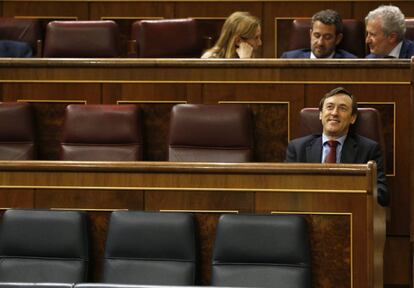Acting government boycotts Congress to avoid criticism from other parties
Popular Party administration argues that it is not accountable to congressional oversight since inconclusive elections

Since the inconclusive elections in December plunged Spanish politics into unknown territory, there have been a series of bizarre episodes. The latest came on Tuesday, as assembled Congress members agreed to cancel a session scheduled for today, when the opposition was due to question the acting government on a series of recent events, including the resignation of acting Industry Minister José Manuel Soria over the Panama Papers scandal.
The reason for the cancellation is the ruling Popular Party (PP)’s continuing refusal to submit to congressional oversight, on the basis that it is a caretaker government whose mandate does not emanate from the legislature that emerged following the inconclusive election of December 20.
If the session had gone ahead, Spaniards would have been treated to the dubious spectacle of opposition politicians addressing empty seats, awaiting a response from absent members of the acting PP government.
We’re not going to enter the realm of fiction and expect a seat to answer us
Aitor Esteban, Basque Nationalist Party
All opposition spokespeople accused the acting executive of being in contempt of Congress, and said that the attitude illustrates the way the PP has governed these past four years.
“The image at the plenary session today is sad, yet consistent with [the PP’s] track record,” said Socialist spokesman Antonio Hernando. “The prime minister’s absence is the political epitaph of a person who spent his entire life avoiding the need to face his responsibilities.”
Podemos leader Pablo Iglesias, a university professor by trade, said that “it is unacceptable for the government and Rajoy to be cutting class.”
Sign up for our newsletter
EL PAÍS English Edition is launching a weekly newsletter. Sign up today to receive a selection of our best stories in your inbox every Saturday morning. For full details about how to subscribe, click here.
Albert Rivera, of the emerging Ciudadanos party, noted that “this is the end of an era, and this is its picture.”
“No citizen watching us now would even think of not showing up for work, like the government has done this Tuesday,” he added. “Turning up is a constitutional obligation.”
For Aitor Esteban, of the Basque Nationalist Party (PNV), the no-show captures the government’s attitude, but he said the session should have been held anyway as a way to shame the PP.
“We’re not going to enter the realm of fiction and expect a seat to answer us, but it would be good to place them [government members] in front of a mirror and capture their portrait,” he said.
Home free?
It appears that the acting government has managed to make it through an entire – if short-lived – term without once submitting to congressional oversight. Given the lack of cross-party consensus to form a coalition or a minority government, next week will be the last time that the legislature convenes before the king dissolves parliament and announces a fresh election, as per Spanish voting legislation.
No new meetings between political leaders have been announced between now and then, and the king has yet to call in party chiefs for one last-minute consultation before he goes ahead with the new call to vote.
Barring any eleventh-hour deal, Spaniards will be asked to go to the polls again on June 26, although polls show that the outcome will be a similarly fragmented political scenario.
English version by Susana Urra.
Tu suscripción se está usando en otro dispositivo
¿Quieres añadir otro usuario a tu suscripción?
Si continúas leyendo en este dispositivo, no se podrá leer en el otro.
FlechaTu suscripción se está usando en otro dispositivo y solo puedes acceder a EL PAÍS desde un dispositivo a la vez.
Si quieres compartir tu cuenta, cambia tu suscripción a la modalidad Premium, así podrás añadir otro usuario. Cada uno accederá con su propia cuenta de email, lo que os permitirá personalizar vuestra experiencia en EL PAÍS.
¿Tienes una suscripción de empresa? Accede aquí para contratar más cuentas.
En el caso de no saber quién está usando tu cuenta, te recomendamos cambiar tu contraseña aquí.
Si decides continuar compartiendo tu cuenta, este mensaje se mostrará en tu dispositivo y en el de la otra persona que está usando tu cuenta de forma indefinida, afectando a tu experiencia de lectura. Puedes consultar aquí los términos y condiciones de la suscripción digital.








































